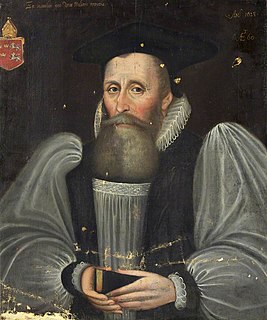Related Research Articles

Sir Julius Caesar was an English lawyer, judge and politician who sat in the House of Commons at various times between 1589 and 1622. He was also known as Julius Adelmare.
Thomas Norton was an English lawyer, politician, writer of verse, and playwright.
Jasper Heywood was an English Jesuit priest. He is known as the English translator of three Latin plays of Seneca, the Troas (1559), the Thyestes (1560) and Hercules Furens (1561).

Thomas Wilson (1524–1581), Esquire, LL.D., was an English diplomat and judge who served as a privy councillor and Secretary of State (1577–81) to Queen Elizabeth I. He is remembered especially for his Logique (1551) and The Arte of Rhetorique (1553), which have been called "the first complete works on logic and rhetoric in English".

Nicholas Felton (1556–1626) was an English academic, Bishop of Bristol from 1617 to 1619, and then Bishop of Ely.
Arthur Yeldard (c.1530–1599) was an English clergyman and academic, chosen as the first Fellow and second President of Trinity College, Oxford.
Thomas Newton was an English clergyman, poet, author and translator.
John Studley (1545?–1590?) was an English academic, known as a translator of Seneca. He contributed to the Seneca his tenne tragedies translated into English (1581), compiled by Thomas Newton and the sole printed translations of Seneca available in Elizabethan England; some echoes of his work have been detected in Shakespeare.
Nicholas Carr (1524–1568) was an English classical scholar, regius professor of Greek at Cambridge in 1547, and a physician.
John Towers was an English churchman, Bishop of Peterborough from 1639, a royalist and a supporter of the ecclesiastical policies of William Laud.
Edward Grant was an English classical scholar, Latin poet, and headmaster of Westminster School. He was also the first biographer of Roger Ascham.
Thomas Tymme was an English clergyman, translator and author. He combined Puritan views, including the need for capital punishment for adultery, with a positive outlook on alchemy and experimental science.
Nicholas Robinson was a Welsh bishop of Bangor.
William Malim (1533–1594) was an English academic, schoolmaster and Neo-Latin author.
Thomas Fowle was a Church of England clergyman, Fellow of St John's College, Cambridge, rector of Redgrave and Hinderclay, Suffolk, and prebendary of Norwich Cathedral.
John Walker D.D. was an English churchman, archdeacon of Essex from 1571.
George Gardiner (1535?–1589) was an English churchman, Dean of Norwich from 1573.
Thomas Everard, Everett or Everat (1560–1633) was an English Jesuit.
John Pory (1502/03–1570) was an English churchman and academic, Master of Corpus Christi College, Cambridge.
Christopher Watson was an English historian and translator.
References
- ↑ . Dictionary of National Biography . London: Smith, Elder & Co. 1885–1900.
- ↑ "Newce, Thomas (NW559T)". A Cambridge Alumni Database. University of Cambridge.
- Attribution
![]()
| This biography about a translator from the United Kingdom is a stub. You can help Wikipedia by expanding it. |